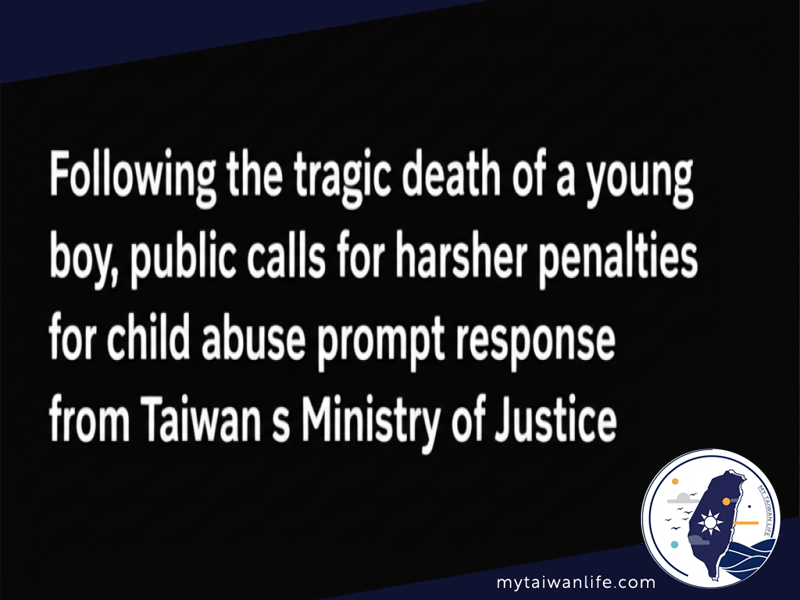Taiwan's Ministry of Justice Responds to Outcry Over Child Abuse Case
Following the tragic death of a young boy, public calls for harsher penalties for child abuse prompt response from Taiwan's Ministry of Justice.

The recent death of a one-year-old boy, nicknamed "Kaika," due to alleged abuse by a caregiver has sparked outrage across Taiwan. This tragedy led to nearly 140,000 people signing a petition advocating for life imprisonment or the death penalty, without parole, for those convicted of child abuse resulting in death. The Ministry of Justice (MOJ) responded on March 16th, initially indicating the proposal would not be adopted, leading to significant public backlash and accusations that Taiwan was becoming a "child abuse paradise."
In response to the public outcry, the MOJ issued a statement on March 17th, emphasizing its commitment to severely punishing crimes against children and respecting public opinion. The MOJ stated they would consider incorporating various viewpoints during future legal reforms.
The petition proposed amendments to Article 271 of the Criminal Code to include provisions for life imprisonment without parole or the death penalty for child abuse resulting in death. It also suggested amending Article 286 of the Criminal Code to impose a minimum 10-year prison sentence, or a 20-year sentence if done for profit, and a fine up to NT$10 million for those who abuse or otherwise harm the physical and mental well-being of individuals under 16 years old. The proposal, submitted on February 20th, was officially recognized on March 16th, requiring a formal response from the MOJ within two months.
Huang Mou-hsin, the MOJ's Permanent Secretary, explained the decision regarding the petition. The suggestion of the death penalty for "destroying evidence" in child abuse cases was deemed unfeasible, as Taiwan's current legal system does not allow for a mandatory death penalty. Similarly, the proposal for a minimum 30-year prison sentence was also considered unrealistic, as the maximum sentence under current law is 15 years. The suggestions regarding "no parole" are being considered, as the parole system is under review, and any opinions will be referenced in future legal reforms.
The MOJ reaffirmed its dedication to significantly punishing severe offenses, especially those involving child abuse. The Ministry acknowledged the public’s concerns and said that during future legislative discussions, the suggested measures would be reviewed. The MOJ also highlighted its stance on prisoners convicted of violent crimes.
Other Versions
El Ministerio de Justicia de Taiwán responde a las protestas por un caso de abusos a menores
Le ministère de la Justice de Taïwan réagit au tollé provoqué par une affaire de maltraitance d'enfants
Kementerian Kehakiman Taiwan Menanggapi Protes Atas Kasus Pelecehan Anak
Il Ministero della Giustizia di Taiwan risponde al clamore suscitato da un caso di abusi su minori
台湾法務省、児童虐待事件への反発に反論
대만 법무부, 아동 학대 사건에 대한 항의에 대응하다
Tumugon ang Ministri ng Hustisya ng Taiwan sa Sigaw ng Pagkundena sa Kaso ng Pag-abuso sa Bata
Министерство юстиции Тайваня отреагировало на возмущение по поводу дела о жестоком обращении с детьми
กระทรวงยุติธรรมไต้หวันตอบสนองต่อกระแสเรียกร้องกรณีทารุณกรรมเด็ก
Bộ Tư pháp Đài Loan phản hồi về sự phẫn nộ trước vụ bạo hành trẻ em

